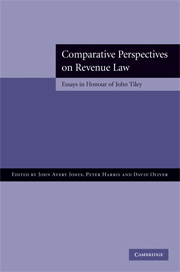Book contents
- Frontmatter
- Contents
- Contributors and affiliations
- Foreword by Dave Hartnett
- Foreword by Hugh Ault
- 1 A comparison of statutory general anti-avoidance rules and judicial general anti-avoidance doctrines as a means of controlling tax avoidance: Which is better? (What would John Tiley think?)
- 2 The judicial approach to avoidance: some reflections on BMBF and SPI
- 3 Comparing the application of judicial interpretative doctrines to revenue statutes on opposite sides of the pond
- 4 Abuse of rights and European tax law
- 5 The US legislative and regulatory approach to tax avoidance
- 6 The law of taxation and unjust enrichment
- 7 The history of royalties in tax treaties 1921–61: Why?
- 8 Land taxation, economy and society in Britain and its colonies
- 9 Meade and inheritance tax
- 10 Taxation, human rights and the family
- 11 Family connections and the corporate entity: income splitting through the family company
- Epilogue: Establishing the foundations of tax law in UK universities
- References
- Table of cases
- Table of abbreviations
- Index
9 - Meade and inheritance tax
Published online by Cambridge University Press: 07 December 2009
- Frontmatter
- Contents
- Contributors and affiliations
- Foreword by Dave Hartnett
- Foreword by Hugh Ault
- 1 A comparison of statutory general anti-avoidance rules and judicial general anti-avoidance doctrines as a means of controlling tax avoidance: Which is better? (What would John Tiley think?)
- 2 The judicial approach to avoidance: some reflections on BMBF and SPI
- 3 Comparing the application of judicial interpretative doctrines to revenue statutes on opposite sides of the pond
- 4 Abuse of rights and European tax law
- 5 The US legislative and regulatory approach to tax avoidance
- 6 The law of taxation and unjust enrichment
- 7 The history of royalties in tax treaties 1921–61: Why?
- 8 Land taxation, economy and society in Britain and its colonies
- 9 Meade and inheritance tax
- 10 Taxation, human rights and the family
- 11 Family connections and the corporate entity: income splitting through the family company
- Epilogue: Establishing the foundations of tax law in UK universities
- References
- Table of cases
- Table of abbreviations
- Index
Summary
Lady Bracknell. … What is your income?
Jack. Between seven and eight thousand a year.
Lady Bracknell. [Makes a note in her book.] In land, or in investments?
Jack. In investments, chiefly.
Lady Bracknell. That is satisfactory. What between the duties expected of one during one's lifetime, and the duties exacted from one after one's death, land has ceased to be either a profit or a pleasure. It gives one position, and prevents one from keeping it up. That's all that can be said about land.
Introduction
John Tiley's first experience of tax was updating Beattie's Estate Duty and his most recent article is on the history of death duties. I want to continue that topic and look at inheritance tax in the light of the proposals of the Meade Committee, on which I had the privilege to serve, knowing Tiley's enthusiasm for recommending the Committee's Report to his students. My timing is bad, as the ‘Mirrlees Review’, popularly known as Son of Meade, is currently in progress. I am glad that the topic of inheritance taxes is still on the Review's agenda, in spite of the international trend away from such taxes, and indeed it received a boost in Professor Alan Auerbach's IFS 2006 annual lecture, given on the same day as the launch of the Mirrlees Review.
- Type
- Chapter
- Information
- Comparative Perspectives on Revenue LawEssays in Honour of John Tiley, pp. 219 - 231Publisher: Cambridge University PressPrint publication year: 2008

